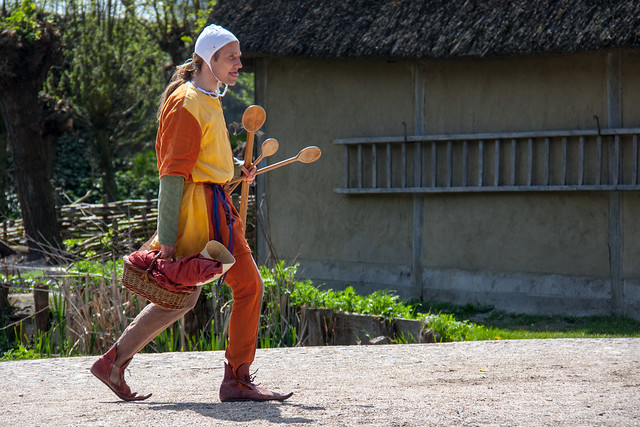Podcast: Play in new window | Download
Today we find out what links frolics and frogs.
Frolic [ˈfɹɒlɪk] means:
- full of fun
- a playful or mischievous action
- an occasion or scene of fun
- to play and run about happily
It comes from the Dutch vrolijk [ˈvroːˌlək] (cheerful, happy, merry), via the Middle Dutch vrolijc and the Old Dutch frōlīk, from the Proto-Germanic *frawaz [ˈɸrɑ.wɑz] (happy, energetic) ultimately from the PIE *prew- (to jump, hop) [source].
Words from the same Proto-Germanic root include the German words froh [fʁoː] (glad, cheerful, merry) and fröhlich [ˈfʁøːlɪç] (happy, cheerful, merry); the Danish word fro [ˈfʁoˀ] (happy, carefree), and Icelandic word frár [frauːr] (swift, light-footed) [source].
The word frog 🐸 comes from the same PIE root, via the Middle English frogge [ˈfrɔɡ(ə)] (frog, toad, wretch, mushroom), the Old English frocga [ˈfroɡ.ɡɑ] (frog), and the Proto-Germanic *fruþgô (frog), from *fruþ (frog) [source].
Another Old English word for frog was frosċ [froʃ], which apparently became frosh in southern English dialects, such as Essex, and is cognate with German word Frosch [fʁɔʃ] (frog) [source].
In Yorkshire, Lancashire, Cumbria and other parts of northern England, the word frosk is/was used for frog, and comes from the Old Norse froskr (frog) [source].
Here’s a video I made of this information:
Video made with Doodly [afflilate link].
I also write about words, etymology and other language-related topics on the Omniglot Blog, and I explore etymological connections between Celtic languages on the Celtiadur.
You can also listen to this podcast on: Apple Podcasts, Amazon Music, Stitcher, TuneIn, Podchaser, PlayerFM or podtail.
If you would like to support this podcast, you can make a donation via PayPal or Patreon, or contribute to Omniglot in other ways.











